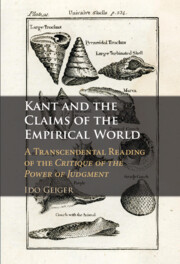 Kant and the Claims of the Empirical World
Kant and the Claims of the Empirical World Published online by Cambridge University Press: 30 April 2022
Chapter 1 points to two problems with the deduction of the principle of the purposiveness of nature in the Introduction to the Critique of the Power of Judgment. The first is that it assumes that empirical knowledge must take the form of a comprehensive hierarchical taxonomy of empirical concepts – but does not explain why. Second, Kant creates high expectations by employing the demanding term "deduction" and promising to seek the grounds of the principle of the purposiveness of nature in the “sources of cognition a priori” – but appears simply to declare that finding a hierarchical system of empirical laws is a need of the understanding and that although we have no a priori insight into its existence “such a unity must still necessarily be presupposed and assumed” by the power of judgment. The Introduction further emphasizes the importance of the notion of pleasure and its relation to our successful attempts to discover the conceptual order of nature. It also argues that the introduction of the aesthetic and logical aspects of the purposiveness of nature gives us good reason to think that the two principal parts of the book are concerned with the latter notion and its transcendental role.
To save this book to your Kindle, first ensure [email protected] is added to your Approved Personal Document E-mail List under your Personal Document Settings on the Manage Your Content and Devices page of your Amazon account. Then enter the ‘name’ part of your Kindle email address below. Find out more about saving to your Kindle.
Note you can select to save to either the @free.kindle.com or @kindle.com variations. ‘@free.kindle.com’ emails are free but can only be saved to your device when it is connected to wi-fi. ‘@kindle.com’ emails can be delivered even when you are not connected to wi-fi, but note that service fees apply.
Find out more about the Kindle Personal Document Service.
To save content items to your account, please confirm that you agree to abide by our usage policies. If this is the first time you use this feature, you will be asked to authorise Cambridge Core to connect with your account. Find out more about saving content to Dropbox.
To save content items to your account, please confirm that you agree to abide by our usage policies. If this is the first time you use this feature, you will be asked to authorise Cambridge Core to connect with your account. Find out more about saving content to Google Drive.